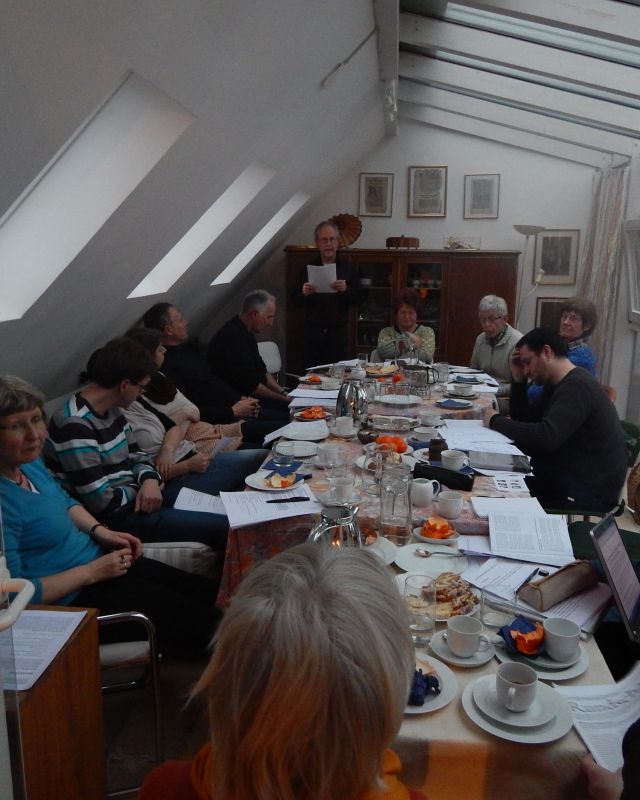
About us
The Geschichtswerkstatt Tübingen e.V. introduces itself.
The History Workshop Tübingen e.V., founded in 1984, is a non-profit association that includes professionals, students and older citizens. The association consists of a three-member board (Heidi Ernstberger, Monika Schober, Dr. Martin Ulmer) and around 25 active and passive members, who are supported by the research assistant Johanna Rost. There are four working groups, including the youth guides. They organize themselves in the Young History Workshop and offer their own events and guided tours. The active members meet regularly every two to three months and present the results of the working groups, consider important decisions and deal with overarching topics of the culture of remembrance and current debates. In addition, there is an office and an archive on the Jewish history of Tübingen. For people with affinity for history who are interested in topics with a local connections, the history workshop is always looking for cooperation.
The history workshop has been dealing with the history of Jews in Tübingen in numerous research and education projects for over thirty years. The Standard Work Destroyed Hopes. Ways of the Tübingen Jews, which was published in 1995 after many years of archive research, interviews and visits to former Jews in their immigration countries, formed the starting point for further projects: On the one hand, the Synagogenplatz monument (1998-2000) and on the other hand, the film Ways of the Tübingen Jews. A search for traces (2004). Further educational projects such as a history reading book for pupils (2004) and the school module Tübingen Jews under National Socialism (2017) for use in the classroom followed.
Current projects are the visits of descendants of the Tübingen Jews and the Hirsch Family Working Group, which deals with the history of the oldest Jewish merchant family living in Tübingen with kinship branches (including Fritz Bauer) and the Forced Labour Working Group. The history workshop regularly organizes the commemorative event for the 9th. November, the anniversary of the Reichspogromnacht, together with the university city of Tübingen. In the film about the Tübingen Jews and the securing of contemporary witnesses in audiovisual documents, the history workshop broke new ground early on.
Since the beginning of the 2000s, the history workshop has been extensively dealing with the history of National Socialism in Tübingen. Several trend-setting and innovative projects have emerged. The historical path to National Socialism, introduced in 2016, visualizes important places, which made Tübingen a stronghold of National Socialism, at 16 stations. So far, it is the only path that deals with this topic in the southwest of Germany. The history workshop played a decisive role in the reorganization of the exhibition on National Socialism at the Stadtmuseum Tübingen in 2019. In addition, fruitful collaborations with the Landestheater Tübingen (LTT) and the Zimmertheater Tübingen yielded theater projects: "perpetrators. A play about good girls and Nazi grandmas" (2016 in the LTT) and "Der Widerspruch - ein Volkslied" (2020 with the Zimmertheater). With the digital project www.NS-Akteure-in- Tuebingen.de, a new platform for documenting Nazi perpetrators, profiteers and participants was created in 2020, which presents new research results and makes them usable for further research as well as for educational work with young people and adults.
In 2009/2010, the history workshop had also initiated a series of events "From brown shirt to white vest: Dealing with the past" with a publication of the same name. The focus was on the problematic handling of the Nazi period after 1945 to the 1960s in Tübingen. The aftermath of National Socialism is always a topic in exhibitions and lectures, even to this day. For example, the history workshop presented its research on the far-right Tübinger Verlag, the Grabert-Verlag, which has existed since the 1950s, in a traveling exhibition at the Volkshochschule Tübingen. Current political developments such as rising right-wing extremism, right-wing populism, anti-Semitism and racism are also regularly taken up in lectures, for example in the lecture on the right-wing populist Kopp-Verlag in Rottenburg, on the AfD or the strengthening of anti-Semitism.